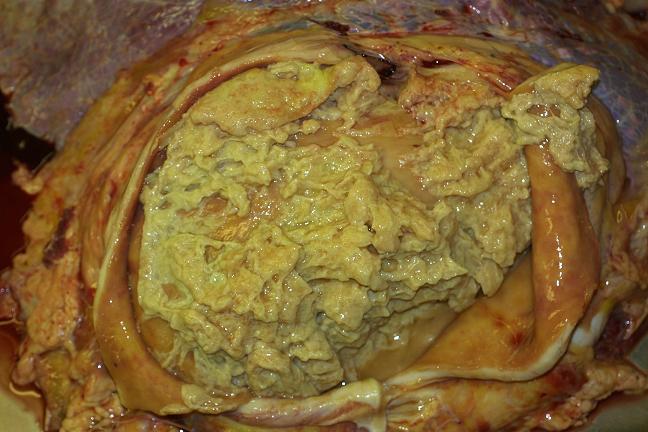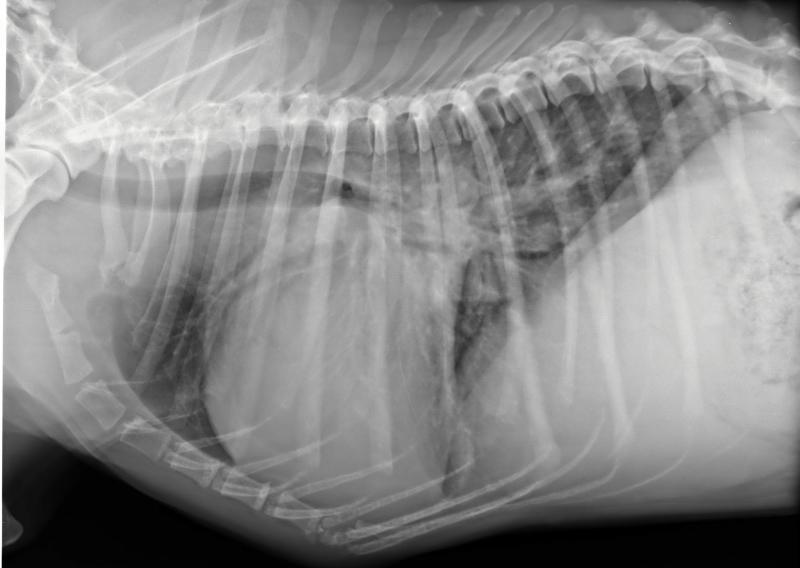Heart Valve Malfunction in the Dog
(Mitral Insufficiency )
This Pet Health Topic was written by O. L. Nelson, DVM, MS, Diplomate ACVIM (IM, Cardiology)
Washington State University.
Many dogs slowly develop degenerative thickening and progressive deformity of one or more heart valves as they age. In time, these changes cause the valve to leak. The mitral valve is most commonly affected. This valve separates the blood collecting chamber (left atrium) from the pumping chamber (left ventricle) leading to the body. Some dogs also develop these changes in the tricuspid valve, which separates the collecting (right atrium) and pumping (right ventricle) chamber leading to the lungs.
Certain breeds have an inherited predisposition to this disease. Degenerative valvular disease is slowly progressive over years and is non-reversible. The volume of blood that leaks back into the atrium with each heartbeat tends to increase slowly over time. However, many dogs with this disease never develop signs of congestive heart failure even though they may have a loud murmur.
Dogs with mitral insufficiency may not show signs or may develop mild to severe heart failure
Early in the disease process, your veterinarian may hear a soft murmur when the affected valve starts to leak. There usually is no noticeable change in the dog's activity level or behavior for a long period of time. Gradually, though, the valve leak tends to get worse and the heart slowly enlarges. If the leak becomes severe, blood may start to back up behind the heart usually into the lungs. This causes lung congestion and fluid accumulation (edema). When lung congestion and edema occur, congestive heart failure is present.
Reduced exercise ability may be the first sign of heart failure. Most dogs with heart failure caused by degenerative valve disease show signs of "left-sided" congestive failure. These signs include tiring quickly, increased breathing rate or effort for the level of activity, excessive panting, and cough (especially with exercise or at night). The presence of any of these signs should prompt a visit to your veterinarian to determine if heart failure (or another disease) has developed.
More advanced signs of heart failure could include labored breathing, reluctance to lie down, inability to rest comfortably, worsened cough, reduced activity, and loss of appetite. Your veterinarian should be consulted right away if these signs occur.
Some dogs that become symptomatic from their heart disease develop fluid in the abdomen (ascites); others have episodes of sudden weakness or fainting that can result from irregular heartbeats or other complications. Sometimes the heart gets so large, either with or without "heart failure", that it compresses one of the airways into the lungs and causes a persistent dry cough.
Treatment for mitral insufficiency is tailored to the individual dog
As long as no sign of heart failure develops, no treatment is necessary, although reduction of dietary salt intake is often advised. Again, there are many dogs with degenerative valvular disease that never progress to heart failure.
However, if heart failure develops, several medications and other strategies are used to control the signs. Since the disease is not reversible and heart failure, when it occurs, tends to be progressive, the intensity of the therapy (including the number of medicines and dosages used) usually must be increased over time.
Website Directory
"What To Expect When You Go To The Vet"
if your pet should have a problem with ...
To include Femoral Head Removal, Hip Dysplasia, Anterior Cruciate Ligament Injuries, Panosteitis, Radiographic Demonstrations, Disc Disease, and Bone Surgery
Strokes, Vascular Diseases, Anemias, DVT, DIC, Blood Parasites, Rat Poison, & Bleeding disorders
Cardiology Heart disease in Cats, Cardiac Hypertrophy, Valvular disease, Cardiac Insufficiency, Congestive Heart Failure, Heartworm Disease, and a little history about the milestones in treating heart disease
Cats: general information page and directory of diseases and problems specific to cats including vaccine recommendations, leukemia, feline viral infections, feline upper respiratory disease and cats that just aren't feeling well.
Dermatology: Skin problems including allergies, rashes, bacterial infections, and itching. Hair Loss, Yeast Infections, Hormonal Problems
Heart disease; Cardiac diseases, vascular diseases, stroke, & heartworms
Hormone Diseases: Diabetes, Thyroid Disease, Cushing's Disease or Hypercortisolism, Addison's disease or Hypocortisolism, Pancreatitis, obesity as a disease
Infectious Diseases Colds, Distemper, Parvo, Leptospirosis, Bruceellosis, Panleukopenia, Feline AIDS, Leukemia, Hepatitis, Kennel Cough, Ringworm, Rabies, FIP, Canine Herpes, Toxic Shock Syndrome, & More
Intestinal problems: diarrhea, constipation, torsion, indigestion, and gas. Also pancreatitis, vomiting, esophagitis, colitis, parvo and other types of dysentery
Metabolic Diseases: Diabetes, Thyroid Disease, Cushing's Disease or Hypercortisolism, Addison's disease or Hypocortisolism, Pancreatitis, obesity as a disease
Parasite Problems Fleas, Ticks, Heartworms, Intestinal Worms, Mosquitos, Lice, Mites, and other welfare recipients
Poisons Snakes, Insects, household chemicals, plants, and foods that might poison your pet
Skeletal-Muscular Problems Arthritis, Fractures, ACL, Ligament Injuries, Disc Disease, Pannus, and many other problems of the bones, muscles, tendons, and ligaments
Skin Problems: allergies, rashes, bacterial infections, and itching. Hair Loss, Yeast Infections, Hormonal Problems
Surgery: Spays, Castrations, Testicle Recipes, Soft Tissue Surgery, Hard Tissue Surgery (Bones), C- Sections, Declawing, Tumor Removal and Cancer Surgery
Other Topics on This Site
Zoonotics: Diseases, worms, and parasites people get from pets.
Includes information about Prescription diets used to treat disease, and a discussion about the pet food industry
Includes information about feline and canine heat or estrus, breeding, C-Sections, pyometra or Infected Uterus, dystocia, no milk, mastitis, & brucellosis
Also newborn care, undescended testicles, and alternative to spaying and castration
WildLife Page: Taking care of baby bunnies, squirrels, and birds. A very funny story about beavers, and other misc information
Our Dog Page: a directory of problems of concern in dogs including parvovirus, distemper, canine herpes, and other diseases
The gross picture above is of an infected heart valve. Bacterial infection is one of the more common reasons for valves in the heart to become badly diseased and uneffective.
Vavle disease is one of the most common reasons for heart failure in dogs.
Bacteria apparently love the high oxygen turbulence around heart valves so that why heart valves are especially prone to infection.
How does bacteria get there in the first place?
Guess what?
The number one entry point into the body for bacteria is through red, puffy gums. So listen to your vet when he or she preaches to you about oral hygiene and dentistry for your pet.

